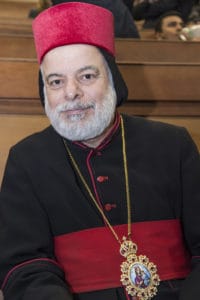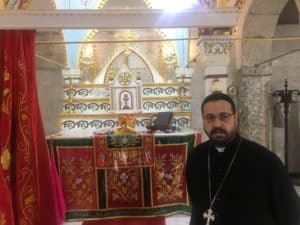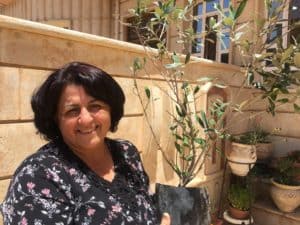Iraqi Christians continue to confront uncertain future
“ISIS TRIED TO TAKE the monastery. In August of 2014 we were convinced that they would succeed,” said Archbishop Timotheos Moussa Al-Shamani, abbot of the Syriac Orthodox Mar Matti Monastery in northern Iraq, founded in the 4th century and one of the oldest in the world. The monks fled, but quickly returned. Hundreds of Christian refugees lived with them for months–just a few miles away from their worst enemies.

Since late 2016, the villages and towns of the region have been freed from ISIS, one after the other. The Nineveh plains have also been liberated. The monastery is no longer in danger. But how are the faithful doing? A reporter for Aid to the Church in Need tried to get some answers.
Archbishop Moussa’s expression darkened, as he said: “Before ISIS arrived in 2014, more than 5,000 Christian families lived in my diocese. Today, there are at most 2,300. The rest have all left the country.” In response to promises by US Vice President Mike Pence to send aid directly to persecuted minorities in Iraq instead of first going through the UN, Archbishop Moussa sounded dubious, saying: “We don’t need words. I can’t even begin to tell you just how many Western ambassadors and politicians I have already spoken with. What we Christians in Iraq need is action.”
He continued: “Peace, safety, jobs: without them, no one wants to stay. I can’t hold it against any head of a family if he chooses to search for a better future for himself and his family in other countries.” Moussa considers it a definite possibility that his Syriac Orthodox community will eventually disappear. “We once had a flourishing home in Tur Abdin in the southeastern part of what is today Turkey. All that is left there today are a few empty churches. That could happen to us here as well.” He is already aware of the next problem they will have to face. “Drive to Bartella,” he said, and ask about the Shabak.”
The journey takes me 15 to 20 miles through the ethnic mosaic of northern Iraq. This is where Turkmen, Christians, Sunni Arabs and Yazidis live. And the Shabak. This ethnic group was estimated to number up to 400, 000 before 2014. Most of them lived on the Nineveh Plains. The villages inhabited by mostly Shia Shabak are noticeably humbler and more dilapidated than those where Christians have been the majority. The Shabak also fell victim to ISIS hatred. The Islamic State holds Shia Muslims, the rafida, “those who reject,” in even greater contempt than Christians. But, in contrast to Christians, Shia have powerful friends. Not only in Baghdad, which is dominated by Shia politicians, but also in Iran, which has a strong presence in the region and in Iraq at large.
“The Shabak want our land,” Abuna (Father) Jakob tersely said; “that is the next problem.” The Syriac Orthodox village priest of Bartella is a nephew of Archbishop Moussa. He leads us through his freshly renovated parish church. Everything gleams in radiant white and gold. Only the charred chapel in a side aisle is a reminder of the jihadists. “It was desecrated by ISIS. We are leaving it as a warning,” the priest said.

The village was liberated from ISIS in October of 2016. But now there is the problem of the Shabak. In 1980, there were only two Shabak families in the village, today their numbers exceed 20 percent of the population. And the trend is upward. A key factor is the high birth rate of the Shabak – and the fact that more Christians than ever are ready to sell their land for a cheap price. The Church is trying to keep its members from doing so. But those who have already used up all of their savings to flee, who are already living outside the country, or who want to emigrate to Australia often have no other choice.
“I will never sell my land to the Shabak,” Ibrahim, a 63-year-old farmer said resolutely. He has seven children—not one of whom has remained in Iraq. “They are in Turkey and in Europe. I keep telling them that they should return, but they don’t want to because there are no jobs here and no safety. In 20 years, there may not be any Christians left,” the man said.
And yet, almost five thousand Christians have returned to Bartella and things have returned to the way they used to be; there is building and reconstruction going on everywhere. The work is being managed by the Nineveh Reconstruction Committee (NRC), which is headquartered neighboring city of Baghdeda, which is also known as Qaraqosh, which was once home to 50,000 Christians. Before 2014, Baghdeda was the largest Christian city in Iraq.
Syriac Catholic Father Georges Jahola welcomes us to NRC offices and shows us maps and aerial photos of his city. He said: “We are rebuilding our homeland. It is the only one we have. Christians live in Baghdad, Basra and Kirkuk. But this is the only region they can really call home. If we lose it, we will lose more than just land and houses: we will lose our identity.”
He continued: “We have more than 7,000 [Christian] houses in our city. We have divided them into three groups: slightly damaged, severely damaged and destroyed.” Almost all the homes were looted by ISIS and the inhabitants of the surrounding Muslim villages. To cut down on costs and give people work, the homeowners have to roll up their sleeves as well. They also have to bear one third of the costs themselves, if possible. Funding is only approved for those who are actually living in their houses.
“A lot of people have started coming back from Lebanon and Turkey again,” Father Jahola is pleased to report. He said: “Our people were saying in the beginning: ‘first safety, then we’ll return.’ I answered them: ‘The more of you who are back here, the better you can protect each other.’” However, because of the lack of safety and jobs, Father Jahola knows that the houses alone will not guarantee that enough Christians will remain in the long run. “But if it weren’t for the houses, there would already be no one left,” he stressed.
Reconstruction is only possible because Christian organizations–with Aid to the Church in Need (ACN) leading the way – are contributing millions of dollars in donations. “The government has no money and other priorities. No one shows their face here. We would be lost without the help of our fellow Christians in the West,” said Father Jahola expressing his gratitude.
To-date, 8,700 families have returned to the Nineveh Plains and more than 4,300 homes have been made habitable again. Each time a home is finished, ACN gives the owners an olive tree, as a symbol of hope.
Rabah has also received a small tree. In her mid-fifties, Rabah has three children. She and her husband originally came from Mosul. They fled from there to Baghdeda in 2006, after their son and nephew were threatened by Islamists. The nephew was kidnapped, their son just barely got away. However, ISIS came to Baghdeda in 2014. The family fled once again. After years of living as Internally Displaced People in Iraqi Kurdistan, state of Iraqi Kurdistan, the family has now been back in their house since July 2017.

“Our car, our gold: we spent everything we had. If Baghdeda had not been liberated, I don’t know what would have happened to us,” Rabah said. Fortunately, their home sustained only minor damages. But emotional wounds run deep. “My husband and I will remain in Iraq, God willing. This is also what our children want. But they don’t have any work. And I am afraid that the same thing will happen to us again—that ISIS will return.”
—Oliver Maksan

